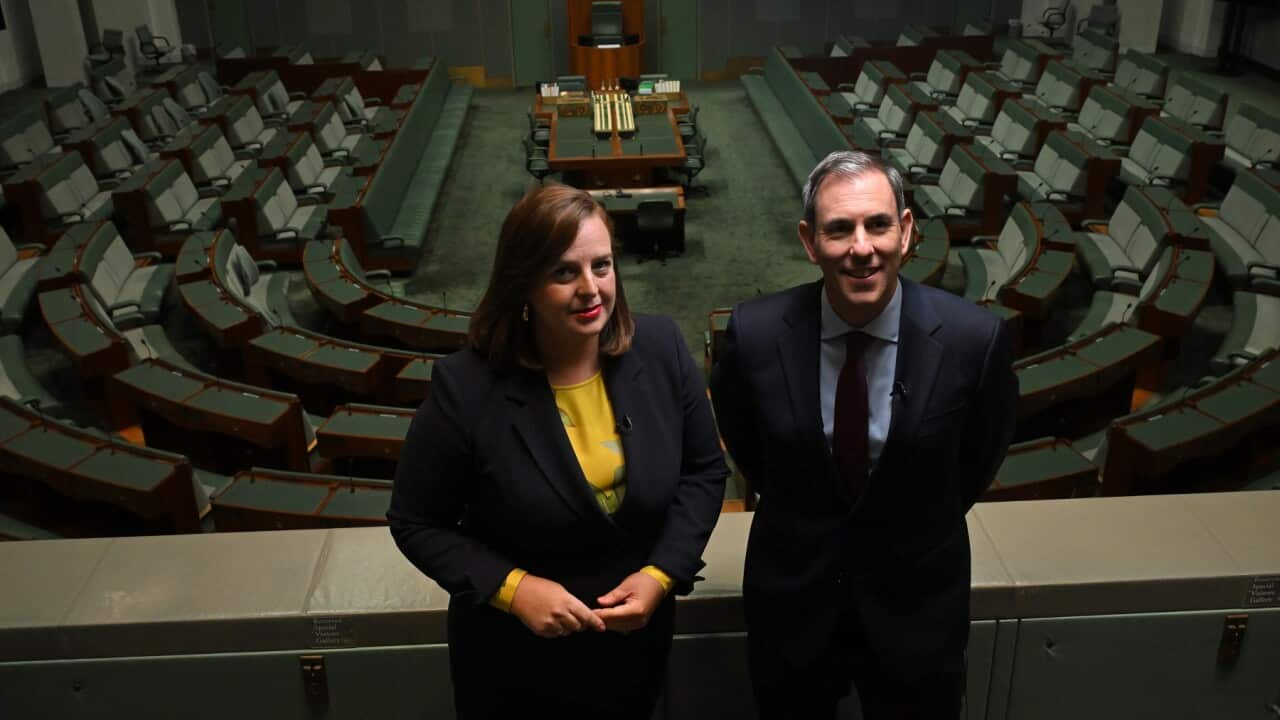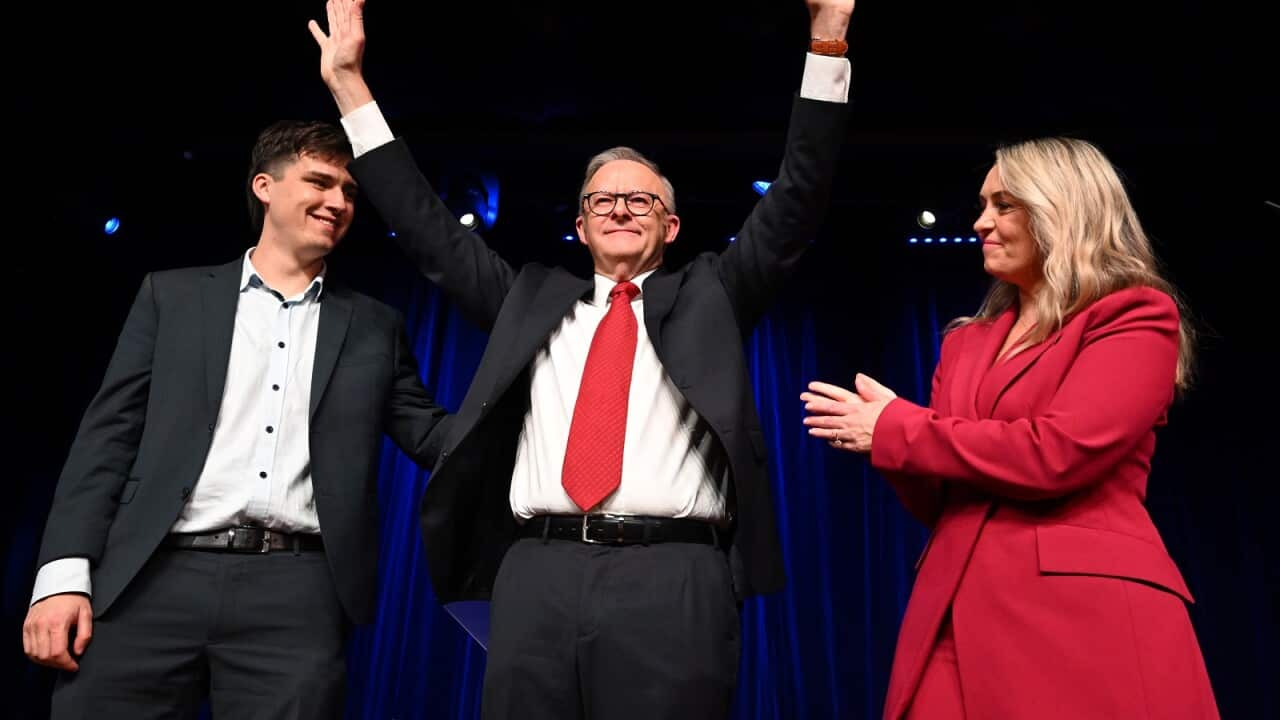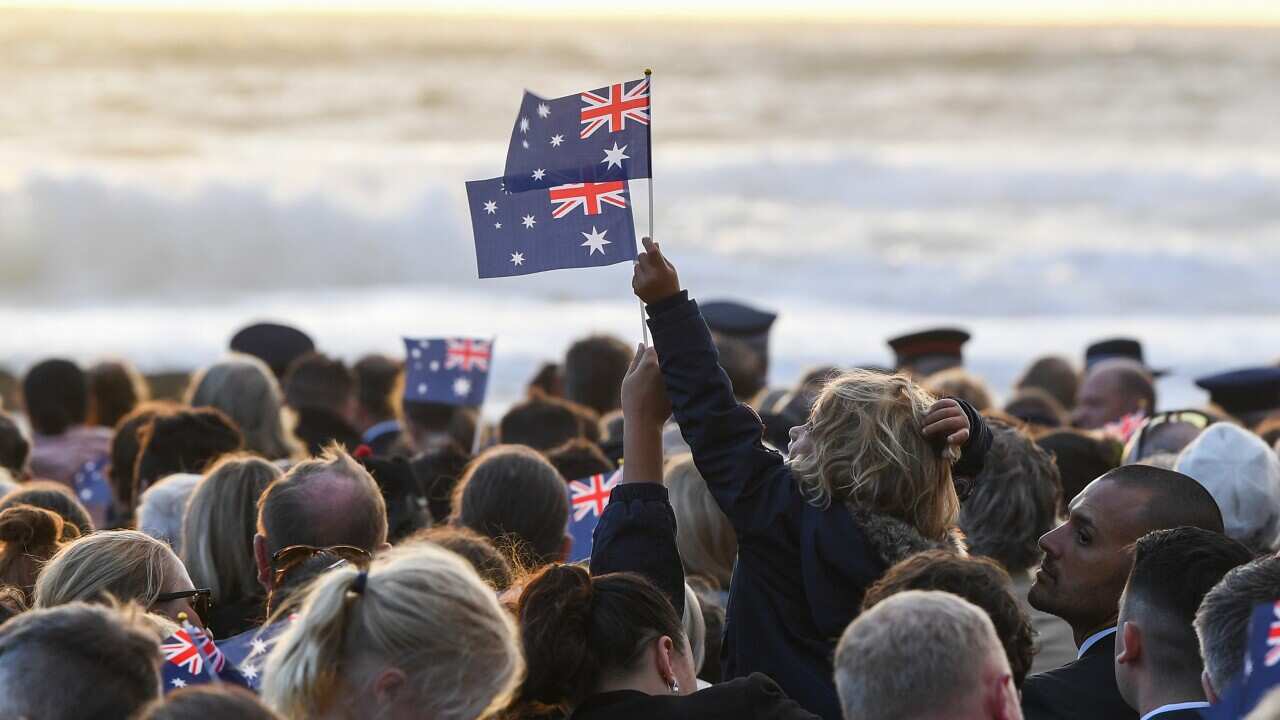TRANSCRIPT
Treasurer Jim Chalmers is to deliver his third budget on Tuesday, May 14th.
As Australia grapples with sticky inflation and a cost-of-living crisis, Dr Chalmers says the budget will deliver targeted relief.
"We would need to always do better and we can do better. And that's why people doing it tough are such a focus in this budget. This budget will be a responsible budget, but it will ease the pressures that people are facing right around the country. And it will also invest in the future and it will be particularly cognisant of the pressures that vulnerable people feel in our society."
Earlier this year, the government announced changes to Stage Three tax cuts.
Stage three tax cuts were the final step of tax changes legislated by the former Coalition government, removing a tax bracket and taxing income between $45,000 and $200,000 at a rate of 30 per cent.
The new plan spreads cuts across the existing tax brackets, reducing the 32.5 bracket to 30 per cent, and increasing the thresholds for tax brackets.
These changes will be the cornerstone of cost of living measures, says Dr Chalmers.
"Well, I think what people will see on Tuesday night is a real focus on these cost of living pressures. And not just us acknowledging that people are doing it tough but actually doing something about it. There will be billions of dollars in relief and assistance for people who are under the pump in addition to a tax cut for every taxpayer which is the main cost of living help in the budget."
Dr Chalmers says housing will be a focus of the budget.
"Well, rents are too high and we don't have enough homes. And that's why one of the highest priorities in this budget is to invest extra billions of dollars into trying to build more homes for Australians to make it easier to build and rent and buy with a special focus, particular focus, on social housing and affordable housing."
The moderate approach to the budget aims to not stoke inflation.
Dr Chalmers says it's challenging to forecast what will happen in an uncertain global economy.
"What the forecasts, what the expectations, will show is that our budget has a role to play, and is playing a role, in getting inflation down in our economy. Obviously, forecasts are difficult at the best of times, and these are especially volatile times. So we've made good progress on inflation in the last couple of years but it's not 'mission accomplished' because people are genuinely still under pressure. The budget will be about alleviating some of that pressure at the same time as we deal with this inflation challenge in our economy."
But he says inflation forecasts are tracking better than the mid-year forecasts.
"You'll see the forecast in the context of the budget. We always update our inflation forecasts. We're actually a little ahead of where we thought we might be in the mid-year update in December. We're actually travelling a little bit better on inflation than was anticipated around six months ago, but we know that people are still under pressure."
Jim Chalmers told the Sydney Morning Herald "it would be better if birth rates were higher", but recognised the financial challenges associated with raising children.
To try and alleviate some of that financial pressure, superannuation will be added to the paid parental leave scheme from July 1st, 2025.
Dr Chalmers says those kinds of measures will make it easier for families to make the choice to have kids, if they want to.
"Well, the point that I made the other day was that it costs a lot to have kids and people make their own choices and I don't for a minute pretend that I have a say in the choices that people make - my job is to make it easier if they want to make that decision. One of the reasons people are making different choices is because it's expensive to have kids. It's not for us to dictate people's choices. But by investing billions of dollars in early childhood education, extending paid parental leave, and now paying superannuation on the government's paid parental leave scheme at a cost of $1.1 billion in this budget on Tuesday, we're trying to give people more choices."
Governments across Australia are trying to address the gender-based violence crisis.
The federal government last week announced a $5,000 escaping violence payment, to assist women fleeing dangerous situations.
Dr Chalmers says there's more to be done to address the issue.
"Well, I think that payment is in is important. It's an opportunity for people who have to leave to try and recognise the really extreme pressure that they're under and it's part of a much bigger investment in the budget. I think from memory more than $3 billion in the budget for this really important area, but we know that it's never enough while women are still unsafe in our community. We want people to be able to make the right decisions for their safety. We want to support those choices. We want to fund the services and the assistance that people need. But for as long as women still aren't safe in our community we know there's more work to do."
Dr Chalmers says overseas migration will be reduced next year.
"Net overseas migration next year will be half what it was last year. That's partly because of the levers that we are pulling in addition to the normalisation of the program. The increase in net overseas migration was largely a function of the students and overseas tourists coming back faster than was anticipated during COVID. And we've responded as any responsible government would and should to make the program as robust and responsible as it can be, and you'll see the fruits of that as the net overseas migration number gets down to more normal levels."
The skills assessment system for migrants looking to work in Australia’s construction or housing sectors will be improved, with 1,900 potential migrants with comparable trade qualifications set to benefit.
Exactly where those applications will be taken from is unclear, but Dr Chalmers says it's not unusual to target particular nationalities for skilled migration.
"We need skilled workers and the first responsibility and the first priority is to train more Australians for those roles, but there's always a role for skilled migration as well. The design of that program changes over time. We want good builders and good construction workers trained here and brought from around the world wherever that might be. It's not unusual in the migration system to try and work out which workers we need and sometimes they come from some parts of the world and sometimes from others. Our job is to make sure we've got the overall system right, training Australian workers, using skilled migration not as a substitute for that but as a complement to that and that's what this game is about."
Labor released its gas plan last week, confirming there will be a reliance on the fossil fuel into the future.
Dr Chalmers says the government's focus is still on renewables.
"The overwhelming focus of this budget is renewable energy because we take the climate change challenge seriously. There will be billions of dollars in the budget for the net zero transformation that we need to see in our economy and around the world so that we can deal effectively with climate change."
Details on Australia's aid spend in the Middle East will be revealed on Budget Day, says Dr Chalmers.
"Well, people will have to see. I mean, obviously, our aid program and our broader funding takes into consideration what's happening in the world. We know that there are consequences, obviously, of rising tensions in the Middle East, and we're cognisant of that, but all of the detail that that will be there on Tuesday night."
Jim Chalmers uses personal affirmations, or positive statements, that help him focus his intentions and challenge negative thoughts.
For the key issues of the 2024-25 budget, Dr Chalmers says his affirmations are based on his postcode.
"I use different ones. On this occasion I have written on my notes 41, which goes back to some of your questions earlier. 41 is the start of all the postcards in my local community. The 4114 is in the middle of my community, the 4127 where I'm from, so yeah, frequently I'll try and use something which focuses the mind and on this occasion as it happens, I didn't know you'd ask me that, on my notes I've got written 41."













